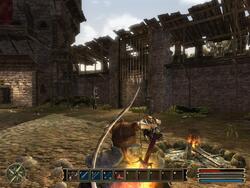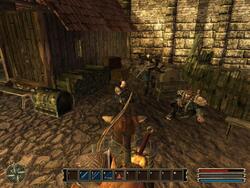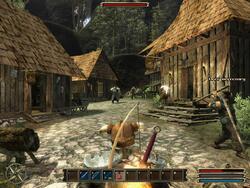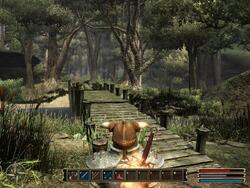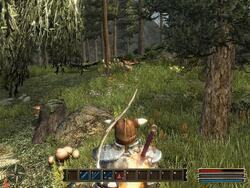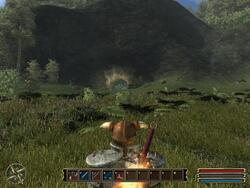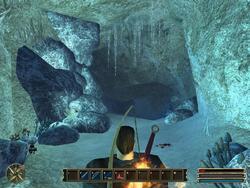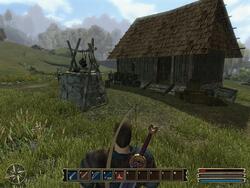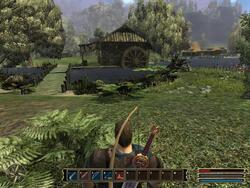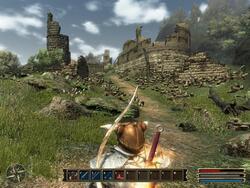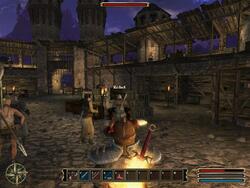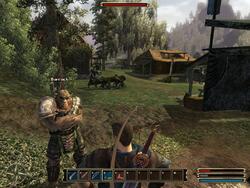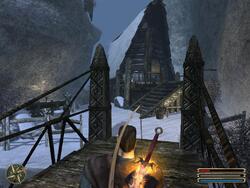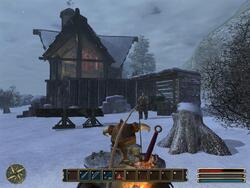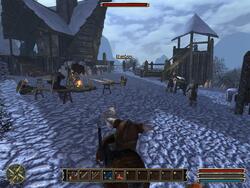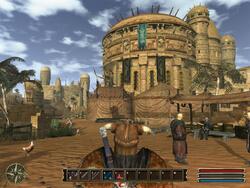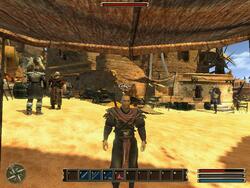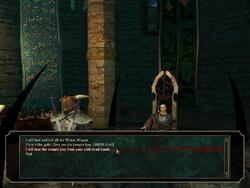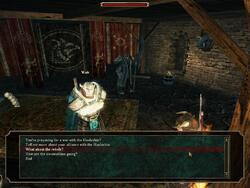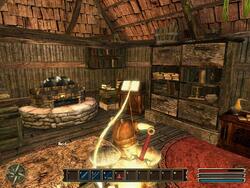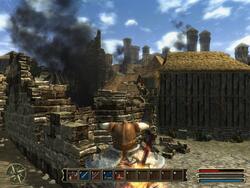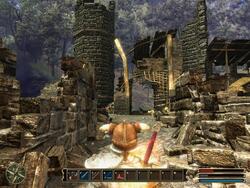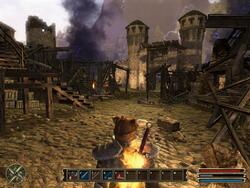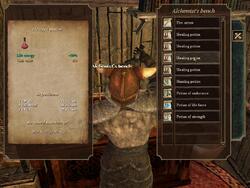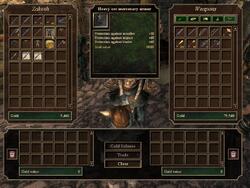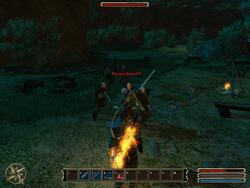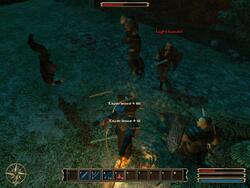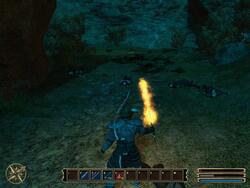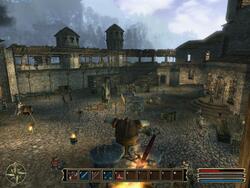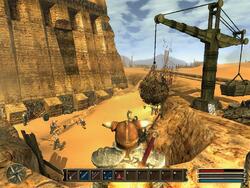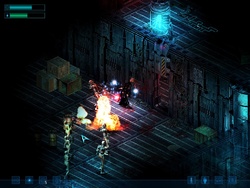Gothic 3 Review
Gothic 3 Review
Review - posted by Vault Dweller on Mon 20 November 2006, 03:46:22
Tags: Gothic III; Piranha BytesOverview
Gothic 3 is the latest addition, and, in my opinion, the best game in the Gothic series, developed by Piranha Bytes, a German developer. The game continues the evolution of the series, expanding the land and the lore, adding a lot of new RPG elements, improving the existing ones, and completely redesigning the character and the combat systems.
After the events of the first two games you've finally escaped from the mining colony island and returned to the war-torn mainland, only to find that the orcs have finally won the war, bringing peace and the Fourth Reich to the kingdom of Myrtana. Being, literally, fresh off the boat, you have absolutely no clue about what is going on. You didn't come as a savior to fight the orcs and save anyone. In fact, you came with an ex-general - one of the key characters from the previous games - who has a score to settle with the king for sending him to the mining prison. The king, however, is temporarily unavailable because his castle is besieged by the orcish army, so the payback visit must wait a bit. The orcs control all towns and are not hostile to you by default. They employ human mercenaries to help them run the towns and control the slaves, so you are welcome to join them. If your racist ass hates all orcs with passion, you can join the rebels instead and fight the oppressors, screaming 'FREEDAAM!!!!' at your monitor Braveheart-style. Needless to say, this and other conflicts create a great role-playing situation where you are given motivations to join different sides and play the game in different ways, which is what I believe role-playing is all about.
Keep in mind though that at least 80% of gameplay is about killing things with extreme prejudice. You will have to fight and you will have to fight a lot. Orcs, humans, goblins, demons, undead, dragons, and hungry wildlife of all shapes and sizes. So if a) you don't like "action RPGs" and/or b) you don't like or suck at Gothic 3 combat after trying the demo, this game is NOT for you. You can stop reading the review at this point and go play something else. What makes the game really shine though is the remaining 20% and the simply amazing overall atmosphere, which is something any aspiring game artist must experience and learn from.
To the south lies Varant - the land of deserts, old ruins and even older temples, the hashashins locked in a struggle with the nomads aided by the Water mages, and the orcs (yes, the buggers are everywhere) digging for artefacts and excavating old temples Indiana Jones style. The hashashins and the orcs have a shaky alliance, but as long as the orcs have enough gold to pay for the passage and their operations, they are welcome to Varant. The nomads are not fond of being slaves, and not overly crazy about the orcs digging and breaking into the sacred ancient temples, disturbing the undead guardians in the process. Yet another conflict for you to join, and another side for you to take.
The land is HUGE, offering almost endless exploration and 24 towns & settlements to visit and work for, and considering the number of quests you can do in each location, that's more than a lot. You can go anywhere and explore anything, but some places will reduce your life expectancy to minutes and creatures like shadowbeasts will tear you apart in seconds, so you will have to shape up a bit before you can walk through the Valley of the Shadow of Death and fear no evil.
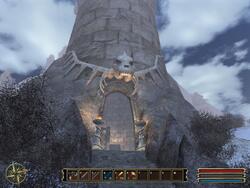
Xardas always had a fondness for creepy towers.
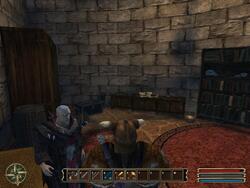
Me, evil? Nonsense! Do I look evil to you?
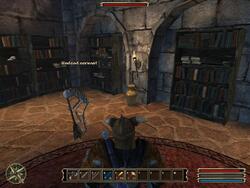
Every house should have one of those.
Gothic 3 is the latest addition, and, in my opinion, the best game in the Gothic series, developed by Piranha Bytes, a German developer. The game continues the evolution of the series, expanding the land and the lore, adding a lot of new RPG elements, improving the existing ones, and completely redesigning the character and the combat systems.
After the events of the first two games you've finally escaped from the mining colony island and returned to the war-torn mainland, only to find that the orcs have finally won the war, bringing peace and the Fourth Reich to the kingdom of Myrtana. Being, literally, fresh off the boat, you have absolutely no clue about what is going on. You didn't come as a savior to fight the orcs and save anyone. In fact, you came with an ex-general - one of the key characters from the previous games - who has a score to settle with the king for sending him to the mining prison. The king, however, is temporarily unavailable because his castle is besieged by the orcish army, so the payback visit must wait a bit. The orcs control all towns and are not hostile to you by default. They employ human mercenaries to help them run the towns and control the slaves, so you are welcome to join them. If your racist ass hates all orcs with passion, you can join the rebels instead and fight the oppressors, screaming 'FREEDAAM!!!!' at your monitor Braveheart-style. Needless to say, this and other conflicts create a great role-playing situation where you are given motivations to join different sides and play the game in different ways, which is what I believe role-playing is all about.
Keep in mind though that at least 80% of gameplay is about killing things with extreme prejudice. You will have to fight and you will have to fight a lot. Orcs, humans, goblins, demons, undead, dragons, and hungry wildlife of all shapes and sizes. So if a) you don't like "action RPGs" and/or b) you don't like or suck at Gothic 3 combat after trying the demo, this game is NOT for you. You can stop reading the review at this point and go play something else. What makes the game really shine though is the remaining 20% and the simply amazing overall atmosphere, which is something any aspiring game artist must experience and learn from.
Q: So, uh, if the game is all about combat, shouldn't I be playing Oblivion instead?
A: We have a mandatory "Gothic 3 vs Oblivion" chapter in the end, so everything shall be revealed in due time.
A: We have a mandatory "Gothic 3 vs Oblivion" chapter in the end, so everything shall be revealed in due time.
The setting
The orcs in Gothic 3 are not some wild beasts, roaming the land, but a well organized tribal society that knows nothing but war and respects nothing but strength. No wonder they have finally won. The buggers have always dreamt of world domination, but were defeated and stopped at every turn, from The Lord of the Rings to Warcraft 3, until Piranha Bytes developers of equal opportunities gave them a chance to run the show. And you know what, it kinda worked. The war is finally over - a fact noted and appreciated by many humans who were sick and tired of it. The towns and settlements are properly guarded and managed. The slave business (trade, management, and hunting) is a booming industry that has even brought the hashashin experts from the south. Great employment opportunities are available for human mercenaries who don't think that hiding in caves & forests, playing Robin Hood, is a good career path.
So, that's Myrtana, aka the kingdom in the middle of the map, featuring lavish forests and the orcish domination. To the north lies the land of frozen plains and tribal hunters - Nordmar. Nordmar has ore mines and quite a few orcish war parties fighting the human clans (Fire, Wolf, and Hammer) for control of the mines and the land. The orcs aren't doing great in Nordmar, but they did manage to capture a key mine with an ancient smelting furnace built into the heart of the mountain. Your old manipulative buddy Xardas - a necromancer and practitioner of dark arts - is also somewhere in Nordmar. He allied with the orcs, so maybe you should follow his example and benefit from his wisdom.The orcs in Gothic 3 are not some wild beasts, roaming the land, but a well organized tribal society that knows nothing but war and respects nothing but strength. No wonder they have finally won. The buggers have always dreamt of world domination, but were defeated and stopped at every turn, from The Lord of the Rings to Warcraft 3, until Piranha Bytes developers of equal opportunities gave them a chance to run the show. And you know what, it kinda worked. The war is finally over - a fact noted and appreciated by many humans who were sick and tired of it. The towns and settlements are properly guarded and managed. The slave business (trade, management, and hunting) is a booming industry that has even brought the hashashin experts from the south. Great employment opportunities are available for human mercenaries who don't think that hiding in caves & forests, playing Robin Hood, is a good career path.
To the south lies Varant - the land of deserts, old ruins and even older temples, the hashashins locked in a struggle with the nomads aided by the Water mages, and the orcs (yes, the buggers are everywhere) digging for artefacts and excavating old temples Indiana Jones style. The hashashins and the orcs have a shaky alliance, but as long as the orcs have enough gold to pay for the passage and their operations, they are welcome to Varant. The nomads are not fond of being slaves, and not overly crazy about the orcs digging and breaking into the sacred ancient temples, disturbing the undead guardians in the process. Yet another conflict for you to join, and another side for you to take.
The land is HUGE, offering almost endless exploration and 24 towns & settlements to visit and work for, and considering the number of quests you can do in each location, that's more than a lot. You can go anywhere and explore anything, but some places will reduce your life expectancy to minutes and creatures like shadowbeasts will tear you apart in seconds, so you will have to shape up a bit before you can walk through the Valley of the Shadow of Death and fear no evil.
The story
The story is almost non-existent, so if you want a good drama with twists and turns, you should consider giving Final Fantasy XII a try. Gothic 3, like the other Gothic games, is about finding your place in a world, carefully choosing your friends and enemies. Travel the land, explore the towns, talk to humans and orcs, do some missions, make some money, and then decide what camp you should join - that's what Gothic 3 offers you. Your companions from the previous games have gone to explore the land and you'll find them in different towns and on different sides.
If you absolutely must know what some global goals are, the fire mages want you to find twelve fire chalices that are scattered all over the land (some of them are guarded carefully and will be traded for a fortune, some of them fell into the hands of orcs/humans who don't know their real value and, thus, could be easily obtained - very nice touch, if you ask me); the ex-general wants a teleporter-to-the-palace stone to finish the, well, unfinished business with the king; I was also asked to find Xardas, but as usual the bastard has managed to talk his way out with some "I can explain!" bullshit instead of laughing maniacally and throwing fireballs at me, which is what evil necromancers called bosses usually do in games. I didn't do much work for the orcs, so I couldn't see the top guys and find out what they want.
The story is almost non-existent, so if you want a good drama with twists and turns, you should consider giving Final Fantasy XII a try. Gothic 3, like the other Gothic games, is about finding your place in a world, carefully choosing your friends and enemies. Travel the land, explore the towns, talk to humans and orcs, do some missions, make some money, and then decide what camp you should join - that's what Gothic 3 offers you. Your companions from the previous games have gone to explore the land and you'll find them in different towns and on different sides.
If you absolutely must know what some global goals are, the fire mages want you to find twelve fire chalices that are scattered all over the land (some of them are guarded carefully and will be traded for a fortune, some of them fell into the hands of orcs/humans who don't know their real value and, thus, could be easily obtained - very nice touch, if you ask me); the ex-general wants a teleporter-to-the-palace stone to finish the, well, unfinished business with the king; I was also asked to find Xardas, but as usual the bastard has managed to talk his way out with some "I can explain!" bullshit instead of laughing maniacally and throwing fireballs at me, which is what evil necromancers called bosses usually do in games. I didn't do much work for the orcs, so I couldn't see the top guys and find out what they want.

Xardas always had a fondness for creepy towers.

Me, evil? Nonsense! Do I look evil to you?

Every house should have one of those.
Taking sides
When you arrive into a new town, usually controlled by either the orcs or hashashins, you need to prove yourself first by completing different quests that the town folks will offer you. Each quest gives you some XPs and raises the local disposition. Once the town's disposition hits 75%, you are allowed to see the town's "upper management". The upper management is usually bloodthirsty and wants you to kill those who oppose them. Such quests (and a certain minor ones) raise the overall disposition with the entire faction. Once the overall disposition hits 75%, which would mean that you've almost eliminated the rebels and effectively closed the alternative career path, you are allowed to meet the orcish war leader.
You are given a lot of freedom, and you don't have to complete all the missions to get the disposition to 75%. The town missions are usually worth 85-95% (maybe even 100% - I'm not sure I found all quests) of the disposition, so you can pick what fits your character the most and ignore what you don't like.
When you arrive into a new town, usually controlled by either the orcs or hashashins, you need to prove yourself first by completing different quests that the town folks will offer you. Each quest gives you some XPs and raises the local disposition. Once the town's disposition hits 75%, you are allowed to see the town's "upper management". The upper management is usually bloodthirsty and wants you to kill those who oppose them. Such quests (and a certain minor ones) raise the overall disposition with the entire faction. Once the overall disposition hits 75%, which would mean that you've almost eliminated the rebels and effectively closed the alternative career path, you are allowed to meet the orcish war leader.
You are given a lot of freedom, and you don't have to complete all the missions to get the disposition to 75%. The town missions are usually worth 85-95% (maybe even 100% - I'm not sure I found all quests) of the disposition, so you can pick what fits your character the most and ignore what you don't like.
Rebels & Nomads: The freedom fighters live in the wilderness in caves and ruins. They are less strict than the town dwellers, so usually you get to see the leaders, including the besieged king, right away without having to bump up the disposition first. Of course, you need to find a teleporting stone first and fight your way through an orcish army to see the king, but that's a different story and a different problem. Needless to say, the rebels have a lot of problems and will welcome your help.
Then there are the forest-dwelling rangers (read "druids"). They love nature and dislike the orcs and anyone associated with them. I've just finished a quest where the orcs were concerned about a burned down farm and slaughtered humans. They thought that some animals did it, and asked me to investigate. Turned out the rangers were responsible for that, because the arrogant bastards would rather kill innocent people than see them working for the orcs. Hardly a black-n-white situation, is it?
Once you've decided what side to take you start either wiping out the rebel scum from caves and forest/mountain bases or liberating towns and settlements from the orcish aggressors. If you are not a "bad enough dude" to do it by yourself, you can usually find some resistance within a town, convince them that the time to act is NOW (usually by freeing someone and/or supplying them with weapons, etc) and then they will gladly join you in your epic struggle to climb the corporate ladder.
Then there are the forest-dwelling rangers (read "druids"). They love nature and dislike the orcs and anyone associated with them. I've just finished a quest where the orcs were concerned about a burned down farm and slaughtered humans. They thought that some animals did it, and asked me to investigate. Turned out the rangers were responsible for that, because the arrogant bastards would rather kill innocent people than see them working for the orcs. Hardly a black-n-white situation, is it?
Once you've decided what side to take you start either wiping out the rebel scum from caves and forest/mountain bases or liberating towns and settlements from the orcish aggressors. If you are not a "bad enough dude" to do it by yourself, you can usually find some resistance within a town, convince them that the time to act is NOW (usually by freeing someone and/or supplying them with weapons, etc) and then they will gladly join you in your epic struggle to climb the corporate ladder.
Quests
Most quests are usually very simple and basic, falling either under "bring me item(s) X" or "kill someone/something", so don't expect any depth there. Despite the simplicity, quests often fit the setting and the situation, adding to the realism instead of subtracting from it. For example, when my character arrived to the capital city that looked like a World War 2 urban battlefield with destroyed buildings, blown up gates, and fortified resistance areas, I was asked to bring food, more weapons, and tools to the soldiers under siege. Makes sense. I had enough food and tools with me, but I had to look for the bundles of weapons in the orcish zones of influence. I was also asked to escort a soldier from one area to another (a common and very deadly quest in Gothic 3), and to find and rescue a soldier who was besieged in one of the towers. So, while it would have been nice to have more complex quests, at very least what Gothic 3 offers wouldn't seem silly and out of place.
Most quests are usually very simple and basic, falling either under "bring me item(s) X" or "kill someone/something", so don't expect any depth there. Despite the simplicity, quests often fit the setting and the situation, adding to the realism instead of subtracting from it. For example, when my character arrived to the capital city that looked like a World War 2 urban battlefield with destroyed buildings, blown up gates, and fortified resistance areas, I was asked to bring food, more weapons, and tools to the soldiers under siege. Makes sense. I had enough food and tools with me, but I had to look for the bundles of weapons in the orcish zones of influence. I was also asked to escort a soldier from one area to another (a common and very deadly quest in Gothic 3), and to find and rescue a soldier who was besieged in one of the towers. So, while it would have been nice to have more complex quests, at very least what Gothic 3 offers wouldn't seem silly and out of place.
The real depth is in choices and multiple ways to get things done, generously offered by Piranha Bytes. Nothing is forced on you, nothing is mandatory - NOTHING AT ALL - so everything is in your hands and up to you.
Character system
Whereas before character development was limited to a few attributes and abilities, now you have tons of skills to choose from. The game offers 7 combat styles: single blade, blade & shield, two blades (dual wielding), two-handed weapons, pole arms, bows, and crossbows. In addition there are hunting skills to skin and remove claws from different animals, crafting skills to mine more ore, create and improve weapons and armor, alchemy skills to create different potions (health, mana, transformation, permanent, poison) and make fire & explosive arrows, magic skills (I didn't have time to try anything magical, so I can't offer you any comments), and thieving skills offering you a different range of activities, from picking pockets and locks to talking your way out of trouble when caught and backstabbing opponents.
Overall, more skills is good, but the system lacks focus. It's way too easy to gain Learning Points, and unless you want to master pretty much everything, soon you wouldn't know what to do with all the points and will probably just keep bumping up your primary attribute and hit points. When you reach this point, you'll most likely lose all the interest in the character development, which is a shame.
I would prefer the previous combat skills setup where you raise your skill very slowly, a few learning points at a time. To compare, in Gothic 2 you need 100 hard-earned points to gain one of the masteries. In Gothic 3 you need only 15 (plus some Strength requirements) relatively easy-to-get points. Furthermore, your success in battles relies more on the number of hit points and timing than on the above mentioned mastery, making the skills less important.
Character system
Whereas before character development was limited to a few attributes and abilities, now you have tons of skills to choose from. The game offers 7 combat styles: single blade, blade & shield, two blades (dual wielding), two-handed weapons, pole arms, bows, and crossbows. In addition there are hunting skills to skin and remove claws from different animals, crafting skills to mine more ore, create and improve weapons and armor, alchemy skills to create different potions (health, mana, transformation, permanent, poison) and make fire & explosive arrows, magic skills (I didn't have time to try anything magical, so I can't offer you any comments), and thieving skills offering you a different range of activities, from picking pockets and locks to talking your way out of trouble when caught and backstabbing opponents.
Overall, more skills is good, but the system lacks focus. It's way too easy to gain Learning Points, and unless you want to master pretty much everything, soon you wouldn't know what to do with all the points and will probably just keep bumping up your primary attribute and hit points. When you reach this point, you'll most likely lose all the interest in the character development, which is a shame.
I would prefer the previous combat skills setup where you raise your skill very slowly, a few learning points at a time. To compare, in Gothic 2 you need 100 hard-earned points to gain one of the masteries. In Gothic 3 you need only 15 (plus some Strength requirements) relatively easy-to-get points. Furthermore, your success in battles relies more on the number of hit points and timing than on the above mentioned mastery, making the skills less important.
Combat
The system has been completely redesigned, moving away from the keyboard commands to more comfortable left and right mouse clicks, and creative fluid and intuitive combat. Fighting against multiple opponents is very easy and enjoyable. The new combat system offers you fast, regular, and "power" attacks, so you can try different things with different weapons and see what works for you the most.
One of the problems with the new system is the stun lock. It's deadly when your hit points are low, so whether you live or die in the beginning of the game will often be determined by whether or not you managed to strike first. The biggest problem, however, is that it's very, very easy to hit a human or orc first. That means that you can easily become the champion of many arenas in the game and can defeat pretty much any single opponent without losing any hit points. Considering that many times you will be fighting angry mobs of humans and orcs, the challenge remains, but it would have been nice if the single opponent combat was challenging as well.
The system has been completely redesigned, moving away from the keyboard commands to more comfortable left and right mouse clicks, and creative fluid and intuitive combat. Fighting against multiple opponents is very easy and enjoyable. The new combat system offers you fast, regular, and "power" attacks, so you can try different things with different weapons and see what works for you the most.
One of the problems with the new system is the stun lock. It's deadly when your hit points are low, so whether you live or die in the beginning of the game will often be determined by whether or not you managed to strike first. The biggest problem, however, is that it's very, very easy to hit a human or orc first. That means that you can easily become the champion of many arenas in the game and can defeat pretty much any single opponent without losing any hit points. Considering that many times you will be fighting angry mobs of humans and orcs, the challenge remains, but it would have been nice if the single opponent combat was challenging as well.
As usual when you fight humans and orcs not hostile to you by default, combat is non-lethal which means that when your opponent runs out of hit points, he falls down, allowing you free access to his inventory, and starts regenerating hit points, until he can get up, usually losing his desire to fight you and accepting your superiority. That allows you to challenge and fight many characters, without killing them and having the entire town / settlement to chase you. There are no immortal NPCs, however. You can kill anyone you want at any point by performing a killing blow when your opponent is recovering on the ground. Needless to say, this would turn everyone in the area hostile to you, which may or may not be more than you can handle.
A mandatory "Gothic 3 vs. Oblivion" chapter
Since I'm the author of the infamous Oblivion review, I might as well explain why I like Gothic 3 a lot, but strongly disliked Oblivion. So, despite many similarities and focus on the action aspects, the key differences are:
1. Gothic 3 offers you to take sides in several active conflicts whereas in Oblivion your side is predetermined and your choice is reduced to choosing a generic guild that doesn't affect anything in the game. You can't join the necromancers or the Mystic Dawn cult, etc.
2. These conflicts can easily change the entire playing field. You can liberate all towns from the orcs (and one from formerly human, currently undead guardians) and repopulate them with humans, or you can wipe out all the rebels, destroying all hope. In Oblivion everything is static and remains the same no matter what you do. The biggest decision you can ever make is whether or not to start the main quest.
3. Gothic 3's quests are more dynamic, allowing you to double-cross easily. In Oblivion, I was often asked not to tell something to other people, but I couldn't do it anyway, since a dialogue option wasn't provided. In Gothic 3, such options are plentiful - in fact, every bit of information that could be beneficial to several parties is immediately turned into 2-3 quests, allowing you to decide what to do with it.
The rebels asked me to find a local resistance guy in a nearby town. When I found the hidden rebel, I went to a mercenary leader and to the orc commander in that town, and was able to tell both of them about the rebel.
A hashashin merchant sells artefacts from far-away lands in an orc-controlled town. I found his brother in a cave nearby digging for artefacts. A quest to confront the merchant was added. I talked to the merchant who paid me to keep my mouth shut. A quest NOT to keep my mouth shut was added immediately. I talked to the orc commander and told him that the there are artefacts in that cave. And so on, and so on.
4. Consequences. I don't really need to explain this one, do I?
5. Gothic 3 is a non-linear game, Oblivion is extremely linear. We are talking about the main quest and the guilds here. Obviously, you can decide which guild's questLINE you will do first, but each guild's quests follow a linear sequence, whereas Gothic 3 lets you decide what quests to take and in what order.
6. Gothic 3 offers you a huge truly living and breathing, very atmospheric world that actually looks like a recently conquered world with ruined towns, crumbling fortresses, burning capital, and crucified paladins and rebels. People go about their daily chores, cutting wood, working fields, hammering anvils, cooking in large pots, mining ore, sitting near fire, cooking meat, and even smoking weed, effortlessly creating an atmosphere the overhyped RAI had failed to.
In comparison, Oblivion was your trip to Disneyland - a land completely oblivious (pun intended) to the death of the emperor, the upcoming demonic invasion, and rather pointless hell gates popping up all over the countryside - populated by people who like to stare at walls a lot.
A mandatory "Gothic 3 vs. Oblivion" chapter
Since I'm the author of the infamous Oblivion review, I might as well explain why I like Gothic 3 a lot, but strongly disliked Oblivion. So, despite many similarities and focus on the action aspects, the key differences are:
1. Gothic 3 offers you to take sides in several active conflicts whereas in Oblivion your side is predetermined and your choice is reduced to choosing a generic guild that doesn't affect anything in the game. You can't join the necromancers or the Mystic Dawn cult, etc.
2. These conflicts can easily change the entire playing field. You can liberate all towns from the orcs (and one from formerly human, currently undead guardians) and repopulate them with humans, or you can wipe out all the rebels, destroying all hope. In Oblivion everything is static and remains the same no matter what you do. The biggest decision you can ever make is whether or not to start the main quest.
3. Gothic 3's quests are more dynamic, allowing you to double-cross easily. In Oblivion, I was often asked not to tell something to other people, but I couldn't do it anyway, since a dialogue option wasn't provided. In Gothic 3, such options are plentiful - in fact, every bit of information that could be beneficial to several parties is immediately turned into 2-3 quests, allowing you to decide what to do with it.
The rebels asked me to find a local resistance guy in a nearby town. When I found the hidden rebel, I went to a mercenary leader and to the orc commander in that town, and was able to tell both of them about the rebel.
A hashashin merchant sells artefacts from far-away lands in an orc-controlled town. I found his brother in a cave nearby digging for artefacts. A quest to confront the merchant was added. I talked to the merchant who paid me to keep my mouth shut. A quest NOT to keep my mouth shut was added immediately. I talked to the orc commander and told him that the there are artefacts in that cave. And so on, and so on.
4. Consequences. I don't really need to explain this one, do I?
5. Gothic 3 is a non-linear game, Oblivion is extremely linear. We are talking about the main quest and the guilds here. Obviously, you can decide which guild's questLINE you will do first, but each guild's quests follow a linear sequence, whereas Gothic 3 lets you decide what quests to take and in what order.
6. Gothic 3 offers you a huge truly living and breathing, very atmospheric world that actually looks like a recently conquered world with ruined towns, crumbling fortresses, burning capital, and crucified paladins and rebels. People go about their daily chores, cutting wood, working fields, hammering anvils, cooking in large pots, mining ore, sitting near fire, cooking meat, and even smoking weed, effortlessly creating an atmosphere the overhyped RAI had failed to.
In comparison, Oblivion was your trip to Disneyland - a land completely oblivious (pun intended) to the death of the emperor, the upcoming demonic invasion, and rather pointless hell gates popping up all over the countryside - populated by people who like to stare at walls a lot.
And in conclusion
Gothic 3 isn't a perfect game, and about every aspect of it could and should have been improved. However, even in the current state, it's a fantastic and highly enjoyable game that I simply couldn't stop playing. Gothic 3 has been referred to as an "unpolished gem" in another review, and I strongly agree with this opinion. If I had to slap a number on G3, it would have been a solid 80-85% score. Hats off to the developers.
A word of warning though: you must have a good computer to run the game, otherwise don't bother. I played it on the highest settings without any ini tweaks, and the performance was flawless.
My specs are:
Pentium D processor 930, Dual Core, 3GHz, 800FSB
2GB Dual Channel DDR2 SDRAM, 533MHz
nVidia GeForce 6800, 256 MB
Gothic 3 isn't a perfect game, and about every aspect of it could and should have been improved. However, even in the current state, it's a fantastic and highly enjoyable game that I simply couldn't stop playing. Gothic 3 has been referred to as an "unpolished gem" in another review, and I strongly agree with this opinion. If I had to slap a number on G3, it would have been a solid 80-85% score. Hats off to the developers.
A word of warning though: you must have a good computer to run the game, otherwise don't bother. I played it on the highest settings without any ini tweaks, and the performance was flawless.
My specs are:
Pentium D processor 930, Dual Core, 3GHz, 800FSB
2GB Dual Channel DDR2 SDRAM, 533MHz
nVidia GeForce 6800, 256 MB




